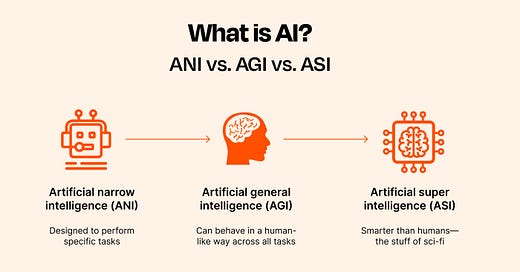In the rapidly evolving landscape of artificial intelligence, OpenAI has reportedly made a groundbreaking development with its new model, Q* (pronounced Q star). This new AI model is said to be capable of solving grade-school-level mathematics, a feat that marks a significant step forward from the capabilities of existing models like GPT-4. The anticipation surrounding Q* stems from its potential as a milestone in OpenAI's quest for Artificial General Intelligence (AGI), a form of AI that surpasses human intelligence across a broad spectrum of tasks.
The Promise of AGI: Transforming Economy and Society
AGI, if achieved, represents a paradigm shift not just in technology, but in our entire way of life. The implications of an intelligence surpassing human capabilities are profound. Economically, it could drive unprecedented efficiency and innovation, potentially creating and transforming industries. In terms of societal impact, AGI could address complex global challenges, from climate change to healthcare, but also raises significant ethical and governance questions. The transition to a world where AGI plays a central role would be as significant as the industrial revolution, fundamentally reshaping work, education, and society.
Delving into the Speculative Technicalities of Q*
The technical underpinnings of Q*, while not publicly disclosed, invites a wealth of speculation, especially considering its purported capabilities. Let's explore some of the potential algorithms and techniques that could be driving this revolutionary model:
Advanced Reinforcement Learning and Q-Learning: At the heart of Q* might be an evolved form of reinforcement learning (RL), possibly an advanced iteration of Q-learning. This would enable Q* to learn optimal strategies in complex, dynamic environments through trial and error, adapting its approach based on feedback and rewards.
Incorporation of Pathfinding Algorithms: The integration of pathfinding algorithms, akin to A*, could allow Q* to efficiently navigate problem spaces. This would be particularly crucial in structured tasks requiring sequential decision-making, a key element in mathematical problem-solving.
Deep Learning and Transformer Architectures: Given the success of transformer-based models in natural language processing, it's plausible that Q* leverages a sophisticated variant of these architectures. This would enable the model to process and understand complex information at a scale beyond current capabilities.
Employment of Symbolic AI: For tackling abstract mathematical concepts, Q* might utilize symbolic AI. This approach involves manipulating high-level, human-readable symbols, enabling the model to handle complex mathematical operations and reasoning.
Neuro-Symbolic AI Fusion: Combining neural networks with symbolic AI could provide Q* with the ability to learn from vast amounts of data while applying logical, human-like reasoning. This neuro-symbolic fusion could be key to its advanced problem-solving prowess.
Hierarchical Learning Models: Q* might employ hierarchical learning structures to decompose intricate problems into smaller, more manageable sub-problems. This approach mirrors the human method of tackling complex tasks, particularly in mathematics.
Cutting-Edge Optimization Techniques: For training such a sophisticated model, advanced optimization algorithms are essential. These would enable efficient solution-finding in the model's high-dimensional space, a critical component for complex mathematical problem-solving.
Meta-Learning for Rapid Adaptation: To swiftly adapt to new tasks with minimal data, Q* might harness meta-learning. This "learning to learn" approach would be indispensable for a model designed to tackle a diverse array of challenges.
Revolutionizing Industries
The introduction of OpenAI's Q* could herald a new era of innovation and competitiveness in the tech startup industry. With its advanced AI capabilities, particularly in solving complex mathematical problems, Q* has the potential to significantly enhance the problem-solving prowess of startups. This could be particularly impactful in sectors where data analysis and complex modeling are crucial, such as biotech, financial technology, and autonomous systems. For instance, a biotech startup like Atomwise, which uses AI for drug discovery, could leverage Q*'s capabilities to revolutionize the speed and accuracy of identifying new compounds. In the fintech sector, companies like Kensho and Affirm could use Q* to refine predictive models, making financial forecasting more accurate and reliable. Startups focused on developing autonomous technologies, such as Nuro or Zoox, might integrate Q* to improve their systems' decision-making and planning capabilities, enhancing safety and efficiency.
Moreover, the democratization of such advanced AI could empower a broader range of startups to innovate, leading to a surge in AI-as-a-Service (AIaaS) offerings. This could enable smaller players to compete with tech giants by providing specialized AI services that were previously out of reach. However, with great power comes great responsibility; startups will need to navigate the ethical implications of such technology. Those that prioritize responsible AI usage, like OpenAI itself, could set industry standards and build trust with users. As AI continues to advance, startups will need to adapt rapidly to stay competitive. Q* could be the tool that not only disrupts existing markets but also fosters the creation of entirely new ones, reshaping the startup ecosystem as we know it.
The Road Ahead
While the specifics of Q* remain shrouded in mystery, the speculation about its capabilities and underlying technologies underscores the rapid pace of advancement in AI. The journey towards AGI, with all its potential benefits and challenges, appears to be accelerating, and Q* might be at the forefront of this transformative era.






